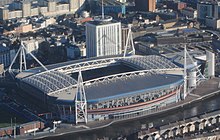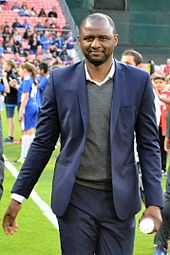2005 FA Cup final
Protests over the impending takeover of Manchester United by American businessman Malcolm Glazer had threatened to overshadow the final, though demonstrations in Cardiff required little intervention from the police.Both managers for the final made surprising changes to their team; Arsène Wenger unconventionally deployed a defensive formation, while Sir Alex Ferguson left midfielder Ryan Giggs on the bench.After two minutes at St Mary's United took the lead; a shot by Roy Keane near the penalty area hit Southampton's Peter Crouch and deflected into the goal.[22] Meetings between Arsenal and Manchester United were keenly contested during the 2000s and highly publicised by the media; the cup final this season had added significance as neither club won the league after a decade of dominance, and it was their only chance of silverware.[23] The emergence of Chelsea, who were crowned league champions in April, had presented a long-term threat to Arsenal and Manchester United's duopoly on English football, as they were financed by Russian billionaire Roman Abramovich."[23] Despite the absence of Thierry Henry, ruled out through injury, and Arsenal's poor recent record against Manchester United, Wenger believed his team were more than capable of winning the match: "What is good in football is that it is not predictable.Referring back to the league fixture in October 2004, he told reporters: "We committed three fouls on Reyes, for instance, but that hardly constitutes The Texas Chain Saw Massacre, does it?"[28] He questioned the character of Arsenal's players after they lost their unbeaten record, and likened their protest to propaganda, as a way to disguise their crisis – "...it was convenient for them to say they were kicked off the park.[29] The build-up to the final had focused upon many Manchester United fans' discontent at their takeover by American businessman and sports tycoon Malcolm Glazer, and large demonstrations were planned inside and outside the Millennium Stadium.[32] The absence of Henry also opened a place in midfield for Gilberto Silva, while José Antonio Reyes and Pires were selected on the wings ahead of Ljungberg and Robin van Persie, who were both named as substitutes.[32] Ferguson had a defensive selection dilemma ahead of the final, with both of his starting full-backs, Gabriel Heinze (ankle) and Gary Neville (groin), having suffered injuries.[38] Manchester United fashioned the first chance of the second half after just three minutes, when Rooney cut inside from the right along the face of the penalty area, but his left-footed shot was blocked away for a corner kick.[35] Soon after, Van Nistelrooy received the ball on the edge of the penalty area and held it up before playing a through-ball to Keane, but the Irishman's low cross was diverted behind by Kolo Touré before it reached Rooney.[35] Ronaldo got past the Cameroonian full-back and then chipped a cross into the penalty area, but Van Nistelrooy was unable to make enough contact with the ball to force his header on target.[41] The second half finished with a Wes Brown cross from the right wing that made its way across the penalty area to Ronaldo, but the Portuguese could only head the ball straight at Lehmann.Arsenal finally got their first shot on target in the seventh minute of extra time, when a Van Persie free kick – awarded for a foul by Silvestre – forced a diving save from Carroll.[42] Four minutes later, Manchester United appealed for a penalty kick when a cross from Giggs struck Cole, but replays showed that the ball hit the Arsenal full-back in the midriff.[40] United then had another penalty shout when Giggs volleyed a long ball from Scholes into Touré's body and up onto the Ivorian's hand, but referee Rob Styles turned their claims down.[40] The match threatened to descend into a mass brawl soon after, when Fortune caught Ljungberg in the face with a flailing arm and then committed a high tackle on Edu, provoking a reaction from the Arsenal players.[35] The next six penalties were all scored – Ljungberg, Van Persie and Cole for Arsenal, Ronaldo, Rooney and Keane for Manchester United – leaving Vieira with the opportunity to win the FA Cup for his team.[46] Mark Lawrenson, the BBC's co-commentator for the final, summarised to his counterpart John Motson: "Well, we must congratulate Arsenal on the way they took the penalties – they were excellent [...] But I have to say over the course of the 120 minutes, Manchester United have been mugged."[47] Henry, who sat out the final due to injury expressed sympathy for Manchester United, and recollected a similar experience from his early Arsenal career: "I know how they feel because we lost against Liverpool and did not deserve to lose."[50] Writing for The Daily Telegraph, pundit Alan Hansen felt the ease in which Manchester United dominated the final and Arsenal's inability to vary tactics highlighted why Wenger needed to make changes in the close season."[51] In the same newspaper, Paul Hayward praised the performances of Rooney and Ronaldo – "surely the best one-club pairing of under-21s in world football,"[52] while ex-Arsenal player Alan Smith noted his former club's win demonstrated how Wenger "for the first time, practically, in his nine-year Highbury tenure, had set up his side with the opposition in mind.[56] Viewing figures compiled by The Guardian showed the BBC's coverage was second only to ITV's broadcast of the 2005 UEFA Champions League Final between Liverpool and A.C. Milan, which amassed 13.9 million viewers.[60] The immediate seasons after Arsenal relocated to the Emirates Stadium in 2006 saw Wenger sell several experienced players, and integrate more young talent, as a means of fostering an identity with the club.[62] Though Wenger managed to solidify the club's position in the Premier League's top four and secure the necessary funds to pay back its debtors, the 2005 Cup win represented Arsenal's last silverware for nine years.In 2014, he led Arsenal to a record-equalling 11th FA Cup,[63] and became the record equalling most successful manager in the competition's history a year later, as his side beat Aston Villa.


2005 FA Women's Cup finalmatch programme2004–05 FA CupArsenalManchester UnitedpenaltiesMillennium StadiumMan of the MatchWayne RooneyRefereeRob StylesHampshirefootballCardiffFA Cuppenalty shoot-outPatrick VieiraPaul ScholesgoalkeeperJens LehmannPremier LeaguereplaySheffield UnitedExeter CityMalcolm GlazerArsène WengerSir Alex FergusonRyan GiggsJosé Antonio Reyes1996 finalcup competitionStoke CityWolverhampton WanderersBolton WanderersBlackburn RoversRobin van PersieFreddie LjungbergDennis BergkampDanny CullipRobert PiresAndy GrayBramall LaneManuel AlmuniaReebok StadiumBBC SportMiddlesbroughEvertonSouthamptonNewcastle UnitedCristiano RonaldoSt James ParkMark SchwarzerSteve McClarenGoodison ParkQuinton FortuneSt Mary'sRoy KeanePeter CrouchRuud van NistelrooyShola Ameobi2004–05 seasonleagueLeague CupFA Community ShieldMillwall2004 finaldoublewon the FA CupTrebleUEFA Champions LeagueChelseaRoman Abramovichtapping-upAshley ColeRio FerdinandThierry HenryPhilippe SenderosSol Campbellleague fixture in October 2004The Texas Chain Saw Massacretheir takeoverAmerican flagsGilberto SilvaEnglandGabriel HeinzeGary NevilleMikaël SilvestreJohn O'SheaTim HowardDarren FletcherRoy CarrollLaurenassistant refereeKolo TouréCamerooniancaptainCesc FàbregasWes Brownpenalty shootoutKevin MoranLjungbergVan PersieVieiraVan NistelrooyScholesRonaldoRooneyAlan SmithNorth YorkshireSouth YorkshireNeale BarryLincolnshireMark LawrensonJohn Motsonwe lost against LiverpoolThe Daily TelegraphAlan HansenJosé MourinhoPaul HaywardThe TimesMatt DickinsonSky SportsBBC OneThe Guardian2005 UEFA Champions League FinalLiverpool